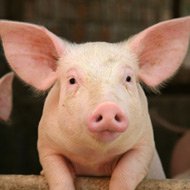
Scientists aim to identify good mums for free farrowing
Scientists from Scotland's Rural College and Newcastle University are embarking on a three-year project to identify pigs that are good mums in a bid to encourage more farmers to switch to higher welfare breeding systems.
Currently, most pig farmers use the farrowing crate to manage sows due to the protection it provides for the piglets. However the crates are restrictive for the mother, keeping her in a small space so that she can’t injure her piglets.
Free farrowing systems, such as PigSAFE (Piglet and Sow Alternative Farrowing Environment) developed by Scotland’s Rural College (SRUC) and Newcastle University and funded by Defra, give the sow space to move around freely. The sow can instinctively build a nest in an enclosure with specially designed sloped walls which help her lie down without trapping her offspring.
Now the SRUC and Newcastle team are leading the three-year FREESOW project, funded by Sainsbury's, that will involve farmers and breeders and aim to identify the ideal mum for the free farrowing system of management.
It is hoped the results will encourage more farmers to switch to higher welfare systems where the pregnant sow can be kept loose during and after the birth of her piglets.
For free farrowing systems to be economically viable for farmers, the level of piglet mortality must be on a par with that in crate systems and it's thought Identifying the best sows for free farrowing systems can help achieve this.
The research team will gather data on three commercial farms with free farrowing systems, creating a profile of a ‘good mum’ by measuring each sow’s performance, i.e. number of piglets born and weaned, and her behaviour, i.e. whether she lies down safely avoiding crushing piglets. They will then determine whether these traits are related, whether they are consistent over time and then whether carefulness can be identified at a pre-breeding age. This data can be used by breeders to help producers pick the best mothers for these systems.
SRUC Researcher Emma Baxter says: “It is vital piglet mortality is on par with the crate system so we can show we can maintain the welfare of the piglets as well as improve conditions for the mum. We have been working on these free farrowing systems for a number of years. However, now Sainsbury’s is involved we hope we can get the information about how to breed good mothers directly through the supply chain much quicker than through traditional academic routes.
“I hope that this will see more farmers adopting these systems which have sow and piglet welfare at the very heart of their design.”



 HMRC has invited feedback to its communications regarding the employment status of locum vets and vet nurses.
HMRC has invited feedback to its communications regarding the employment status of locum vets and vet nurses.